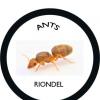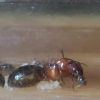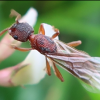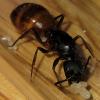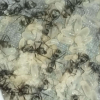Hi! I just have a few questions regarding keeping Camponotus ants. They're a tropical species of Camponotus ant that are 11 weeks old and currently at 10 workers with a couple of eggs and larvae (more larvae of different stages).
1. Are ants able to eat solids, such as cooked meat? or something dry like beef jerky? (as temporary replacements from the regular mealworms and crickets)
2. Is there a specific time when queen ants lay eggs, perhaps when there is a high protein supply? (what causes them to lay more?)
3. Since they're in a test tube set-up how often should honey be given and cleaned out?
4. Do you have any recommendations on how to clean out old test tubes? (and how to take out the cotton blocking the water? I find it really hard to pull out the cotton)
Thank you so much everyone! 
To answer your questions:
Q: Are ants able to eat solids, such as cooked meat? or something dry like beef jerky? (as temporary replacements from the regular mealworms and crickets)
A: Yes they are capable of eating things such as chicken, beef, steak, etc. However, It should not be a staple food though due to the preservatives. As for dry foods, the ants will not take too much interest in it. UNLESS they are starving, they will see the jerky as a brittle block not ideal for consumption. Ants need their juices.
Q: Is there a specific time when queen ants lay eggs, perhaps when there is a high protein supply? (what causes them to lay more?)
A: Yes, queens don't just lay eggs for no reason. In terms of protein; the colony knows how much food there is. If food is stable and increasing, the queen may lay more eggs, and vice versa. Heat, nesting, vibrations, etc also all have a role on when the queen decides to lay eggs. As for a specific time to lay eggs, it mostly depends on when the species has a nuptial flight and where the species is. For example some queens might wait till after diapause to begin laying eggs. Your Camponotus queen is exotic, however, so she won't go through diapause.
Q: Since they're in a test tube set-up how often should honey be given and cleaned out?
A: It depends on preservatives, how large the colony is, how clean the tube is, etc. However, honey dries out after only a couple of days and past that can not be consumed. So clean the tube every couple of days. I feed my ants honey water every few days on a piece of aluminum foil which I grab with tweezers after a couple of days. Don't use 100% honey btw, use a 50% Honey 50% Water mixture and serve it on a piece of aluminum foil.
Q: Do you have any recommendations on how to clean out old test tubes? (and how to take out the cotton blocking the water? I find it really hard to pull out the cotton)
A: There are a couple different ways for cleaning out tubes, but I recommend filling a tub with soapy water and letting the tubes sit for an hour or two. As for getting the cotton block out of the tube, before I got tweezers, I used a chopstick or back end of a spoon to wedge and pull it out. You can also use scissors if you have a small enough pair that will fit in a test tube.
Hope this helps!
![]()



